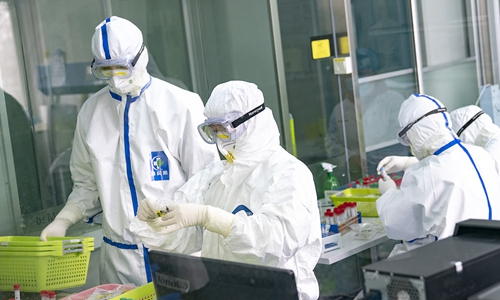HOME >> CHINA
Biosafety guideline issued to fix chronic management loopholes at virus labs
By Liu Caiyu and Leng Shumei Source:Global Times Published: 2020/2/16 20:13:40
Rules address chronic virus lab loopholes: experts

Staff members work in a laboratory in Wuhan, central China's Hubei Province, Feb. 13, 2020. (Xinhua/Xiong Qi)
The Ministry of Science and Technology issued new rules over the weekend, requiring laboratories nationwide to boost their biosafety in a move that experts said could fix chronic inadequate management issues during the campaign against the coronavirus.
The guideline stressed the importance of strengthening the management of bio labs, especially on viruses, to ensure biosafety, ministry official Wu Yuanbin said at a press conference on Saturday.
The release of the guideline deals with chronic loopholes at laboratories, Yang Zhanqiu, a deputy director of the pathogen biology department at Wuhan University in Hubei Province, told the Global Times on Sunday.
"The mention of biosafety at labs by the ministry has nothing to do with some saying that the coronavirus leaked from the Wuhan Institute of Virology of the Chinese Academy of Sciences," Yang said.
Laboratories in China have paid insufficient attention to biological disposal, Yang said.
Lab trash can contain man-made viruses, bacteria or microbes with a potentially deadly impact on human beings, animals or plants.
Some researchers discharge laboratory materials into the sewer after experiments without a specific biological disposal mechanism, Yang explained.
A minor SARS virus infection in Beijing and Anhui in 2004 was resulted from insufficient management and improper inactivation process at a lab, according to the People's Daily.
The small outbreak originated at a diarrhea lab of the virology department affiliated with Centers for Disease Control and Prevention, the article said. After the virology department was sealed off, no SARS patients were found.
Medical staff and experts have long been asking for better regulation and supervision of biological research institutes in China, but with mixed results.
A top academician at the Chinese Academy of Engineering earned 10.17 million yuan ($1.46 million) by illegally selling off lab animals and experimental milk, according to a report in the Shanghai-based The Paper.
Li Ning, a leading expert at transgenic technologies at China Agricultural University, was sentenced to 12 years in prison on January 2 for grafting 37.56 million yuan.
Management on biology labs is an issue not just for China. The US Centers for Disease Control and Prevention also launched actions in August 2014 to improve its laboratory safety following incidents where research fellows failed to process virus samples properbly.
Some internet conspiracy theorists have tried to link the outbreak to the newly built Wuhan Institute of Virology, about 80 kilometers from the official epicenter of the coronavirus outbreak.
Obscure online articles have alleged links to a Chinese biological weapons program.
But given its extremely strict management, there was no chance that China's only biosafety level 4 lab was involved in leaking the coronavirus, Yang told the Global Times.
The early cases were discovered near the seafood market, not the lab, Yang said.
A US senator, Tom Cotton, has cited suspicions about the lab.
"It's groundless and ridiculous," Li Wei, a counterterrorism expert at the China Institute of Contemporary International Relations in Beijing, told the Global Times. "The US allegation is misleading the public, which is extremely irresponsible."
At a time when China was fighting a viral crisis that threatened thousands of lives, it was wrong for "the US" to associate it with a biological weapon, Li said.
As to why the US promoted the theory, there was no way of knowing, Li said.
"But according to the mindset of the US, it always thinks other countries would do the same thing as it does," Li said.
The social media debate about the Wuhan biolab was also criticized by international experts quoted in the BBC and HuffPost.
All the evidence shows the virus similar to a bat coronavirus and Chinese experts say it most likely originated at the Wuhan Huanan seafood market.
Newspaper headline: Ministry strengthens biosafety
Posted in: SOCIETY,CHINA FOCUS